BackgroundThe advent of deepfake technology, driven by advancements in artificial intelligence, has revolutionized how digital media can be manipulated. Using techniques like generative adversarial networks (GANs), deepfakes can convincingly alter images, videos, and audio, making it increasingly difficult to distinguish between authentic and fabricated content. As these technologies become more sophisticated and accessible, they pose significant challenges to the integrity of media across various domains, including journalism, law enforcement, and personal privacy. Understanding and detecting deepfakes is critical in maintaining trust in digital media and protecting against the spread of misinformation. |
Keywords
|
Goal/Rationale:
The primary challenge presented by deepfakes lies in their potential for misuse—spreading false information, defaming individuals, and compromising security systems. The goal of this workshop is to address these issues by equipping participants with the tools and knowledge necessary to detect and counteract deepfake content. Recent advances in AI and digital forensics have led to the development of sophisticated detection techniques, but as deepfake technology evolves, so too must our methods of identifying and mitigating its impact.
This workshop will explore the latest techniques in deepfake detection, offering insights into how these methods can be applied across different media types. Participants will gain a comprehensive understanding of both the technical aspects of deepfake creation and the practical tools available for their detection. By the end of the workshop, participants will be better prepared to tackle the challenges posed by deepfakes in their respective fields, whether in media, law enforcement, cybersecurity, or beyond.
Scope and Information for Participants
This workshop will cover a wide range of topics within the scope of deepfake detection, including:
- Introduction to Deepfakes: The underlying AI technologies, including GANs, used to create deepfakes.
- Digital Forensics: Techniques and principles for verifying the authenticity of digital media.
- Detection Tools: Demonstrations and hands-on experience with the latest software for identifying deepfakes.
- Legal and Ethical Considerations: The broader implications of deepfakes on privacy, ethics, and legal frameworks.
- Case Studies: Analysis of real-world applications and instances of deepfake technology.
We encourage professionals, researchers, and students in fields related to digital media, cybersecurity, and AI to participate. The workshop will provide valuable knowledge and practical skills, regardless of your current level of expertise in deepfake technology.
